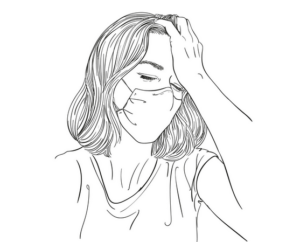
If you’re a mathematician, you may best know division as one of the four basic operations of arithmetic. In my world – that of understanding human behaviour – I associate the word division with the way in which people’s relationships are impacted as a result of them being on different wavelengths, for example. Lately, this word has taken on a further layer of complexity because it appears that Covid has been one of the primary reasons that dividing thoughts and beliefs are impacting people around the world and the long-term ripple effects of these divisions are very much still here.
When Covid first became a “thing”, people voiced differing opinions about how they were going to follow new rules, whether or not they were going to get vaccinated, whether or not places where people gather should open or not, and now that it is voluntary in most places, whether or not to wear a mask in public.
On April 4, 2022, The Canadian Press released the results of a survey. They wrote that this survey “suggests more Canadians are becoming divided, with some saying issues have led them to reduce contact with friends or family.
The national phone survey by the Canadian Hub for Applied and Social Research at the University of Saskatchewan was done between March 7 and March 24. It asked 1,011 people about the issues that divide them the most.
About three out of every four respondents said they believe society has become more polarized.”
A couple of weeks ago, on the first day that wearing a mask was voluntary, I went to a mall. I didn’t go to the mall on that day specifically. It just so happened that I needed an item from a store inside a mall. However, knowing that I was about to enter a place that was once prohibited to any naked-faced people, left me feeling a little perplexed about what to do. So, I wore my mask around my chin as I entered and then scanned my surroundings. Most people close to entrance who were standing in a line up waiting for the bank to open were socially distanced and wearing masks. As I ventured a little beyond the entrance, I noticed that the majority of people were in fact wearing masks, too. Feeling a little like a rebel and a lot liberated, I continued towards my destination. I noticed that others, like me, were looking around them to see what others were choosing to do. I noticed a few people who saw me coming towards them, deviate from their straight path, probably wanting to avoid breathing in the air around me. When I arrived at the store, which was relatively small, I put my mask on, knowing that I would be speaking to a sales person and seeing the workers with theirs on too. When I left the store, I took it off again.
Later that day, I ran another errand in a store outside of the mall and was greeted by an employee with a wide grin. She acknowledged how wonderful it was not to have to wear a mask and said, “feel free to take yours off”.
Since that time, I have been to medical appointments and on the TTC. I wear my mask, as do most others, since it is still mandatory in certain places. I guess, like most things these days, I have taken a hybrid approach to mask wearing.
Despite the new rule, you may still be choosing to wear a mask. Or you may already have had Covid, and feel a sense of real or imagined greater protection and chosen to not wear one most of the time. Or you may have thrown caution to the wind, no longer tolerant of having to cover your face, believing that we need to learn to live with Covid because its here to stay, you might say, and not wearing your mask at all. And this is where division comes in again. You may – silently or out loud – condemn those who have chosen to mostly not wear a mask or you may be frustrated by your friends or family who have chosen to remain wearing masks for now or forever. And these feelings may impact whether or not you choose to spend time or interact with them.
All of these differing opinions and beliefs, with most sides being as vehemently passionate as the other, lead to division. Covid has magnified the way in which we judge, condemn and criticize other human beings for their beliefs and choices. I encourage everyone to work towards more kindness, compassion and empathy and to not allow our differences to create an even bigger fracture line in the fabric of human interaction and connection.











